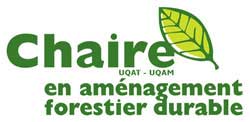Assessing the health of aquatic food webs after restoration of a degraded ecosystem: The Osisko Project
- Direction : Director: Guillaume Grosbois (UQAT) guillaume.grosbois@uqat.ca
Codirectos : Miguel Montoro Girona (UQAT) miguel.montoro@uqat.ca, Maikel Rosabal (UQAM) rosabal.maikel@uqam.ca
Collaborators : Geneviève Aubry (Collectif territoire), Mostafa Benzaazoua (UQAT), Patrick Martel (Technosub), Martin Bélanger (MFFP)
Partenaires : Hécla Québec, Technosub, Conseil régional de l’environnement de l’Abitibi-Témiscamingue, Organisme du Bassin-Versant du Témiscamingue, Ville de Rouyn- Noranda
- Institution : UQAT
- programme : Ph.D. in forest ecology
- Support financier : Scholarship of $21,000 per year for 3 years.
- Date d'inscription : May 2022
- Offre en format pdf: Télécharger
Urban Lake Osisko ("muskrat" in Anicinabe language), an identity jewel of the Rouyn-Noranda City, is now a degraded ecosystem, being intimately linked to the history and development of the city. Many lakes have been degraded by mining and urban activities in Abitibi-Témiscamingue, contributing to the increase of heavy metal concentrations in the aquatic environment and organisms. The area is one of the richest regions in the world in terms of aquatic environments, but also has one of the highest pressures for mining resources. However, the state of degradation of the lakes is rarely assessed, especially in terms of loss of ecosystem functions. Given the importance of the aquatic resources and services that the boreal lakes provide for the economic and social development of Canadians, innovative solutions are needed to rehabilitate these ecosystems and thus improve the quality of the habitat of freshwater species, particularly aquatic fauna, which are among the most vulnerable in the boreal biome.
The objective of this project is to evaluate the effect of different ecological restoration methods on the aquatic food webs and ecological functions of Lake Osisko. The project will be carried out in several axes: (i) Assess the environmental degradation of the lake and the level of heavy metal contamination of aquatic species (invertebrates to fish); (ii) Test the effects of different restoration methods on the environmental quality of Lake Osisko.
Profil recherché
- Education: Master's degree in ecology, biology or environmental sciences with a particular interest in aquatic environments and/or ecotoxicology.
- Requirement: Be motivated and determined to contribute to the improvement of the health of degraded ecosystems. Enjoy working outdoors in natural environments, on the water and in a multi-sectoral team. Driver's license required, boat license is a bonus.
- Skills: Leadership, autonomy, dynamism, organizational skills, determination, curiosity, ability to communicate
- Assets: Statistics courses, ability to swim, first aid training.
- Equity, Diversity, Inclusion: We encourage applications from people from under-represented groups in science (Indigenous people, women, visible and ethnic minorities, LGBTQ+).
Lieu
The student will be part of the Research Group in Ecology of the MRC-Abitibi (GREMA) and will be based at the Amos campus of the Forest Research Institute (IRF) of the Université du Québec en Abitibi-Témiscamingue (UQAT). UQAT offers a quality environment for students, close to nature, with many cultural activities and an excellent quality of life thanks to its many outdoor activities. Our research team is young, dynamic and multicultural. Although UQAT is a French-speaking university, we offer a bilingual French-English environment for successful research. The student will be a member of strategic groups of excellence in Canada such as the Interuniversity Research Group in Limnology (GRIL) and will work in close collaboration with our partners. The project will include a significant amount of fieldwork for lake sampling, as well as laboratory analysis and writing scientific papers.
Direction
Director: Guillaume Grosbois (UQAT) guillaume.grosbois@uqat.ca
Codirectos : Miguel Montoro Girona (UQAT) miguel.montoro@uqat.ca, Maikel Rosabal (UQAM) rosabal.maikel@uqam.ca
Collaborators : Geneviève Aubry (Collectif territoire), Mostafa Benzaazoua (UQAT), Patrick Martel (Technosub), Martin Bélanger (MFFP)
Partenaires : Hécla Québec, Technosub, Conseil régional de l’environnement de l’Abitibi-Témiscamingue, Organisme du Bassin-Versant du Témiscamingue, Ville de Rouyn- Noranda
Renseignements
Send your resume, cover letter, transcripts and contact information for two references to the attention of Guillaume Grosbois (guillaume.grosbois@uqat.ca).
We are waiting for your applications! Come and share a great professional adventure with us and contribute to the restoration of aquatic ecosystems!
Retour à la liste des offres